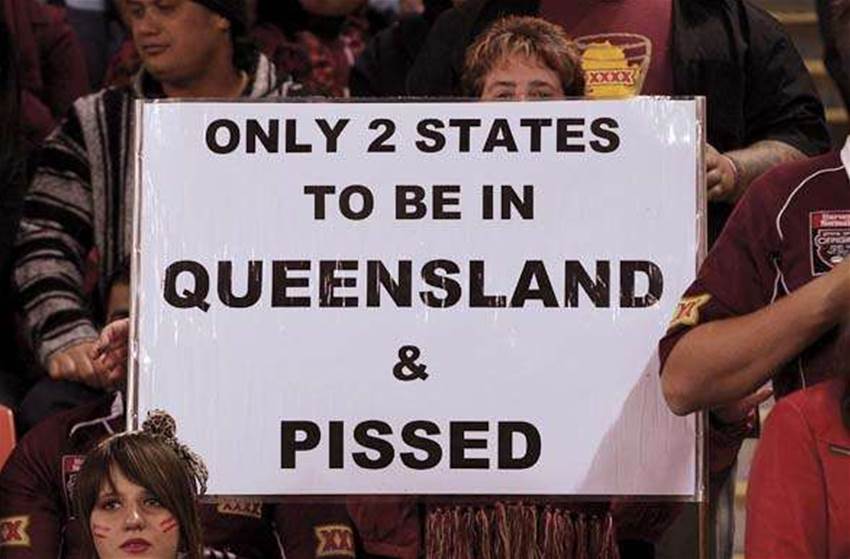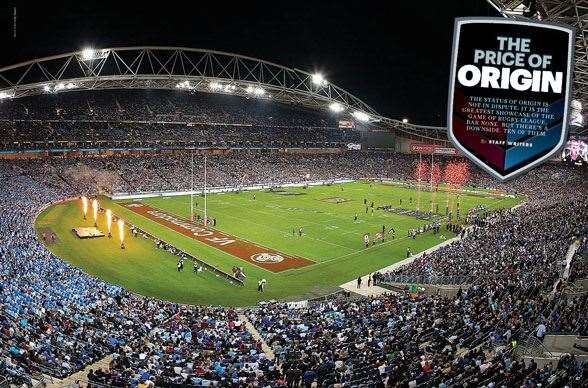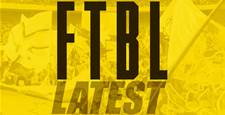The greatest showcase of rugby league does have its downside.
The status of State of Origin is not in dispute: it is the greatest showcase of the game of rugby league, bar none. But there is a downside. Ten of them …
ORIGIN DIMINISHES THE INTERNATIONAL GAME
Wayne Pearce still describes being ruled out of the 1986 Kangaroo Tour due to a knee injury as the absolute low point of his brilliant career. Many modern players’ attitudes, though, are “what Test match?” Witness the lead-up to last year’s Four Nations tournament at the end of the season, and the whopping 12 players who pre-declared their unavailability for Australia on injury grounds. Earlier, Sonny Bill Williams was missing from the annual Anzac Test, apparently still angry he'd been caught up in a sleeping pill/energy drink scandal from the 2013 World Cup. Kiwi officials said he wouldn’t have been picked anyway, as he wouldn’t be playing a part in the future direction of NZ rugby league ... But there’s the rub: international rugby league is so outshone by Origin these days that the once-sacred, mid-season Aussie-Kiwis Test has been relegated to a non-NRL “Rep Round”, where it shares the stage with an annual City-Country fixture that many fans argue should’ve been killed off 20 years ago, and a Pacific Islands event, which this year was a double-header featuring PNG vs Fiji and Samoa vs Tonga.
Domestic Origin, not international football, is lauded as the game’s peak experience. Just over four million viewers watched the Blues break Queensland’s eight-year reign, while 83,421 fans went along to ANZ Stadium and saw that second game live. In comparison, just 25,000 attended the one-off Test at Allianz a few weeks earlier. Origin keeps international football in the shade.
PLAYERS BURN OUT
Recall the score from the first match of last year’s Origin series? Eight. Eight what? Eight broken players. Cooper Cronk, broken arm. Billy Slater, AC joint. Anthony Watmough, biceps. Daly Cherry-Evans, knee. Brett Morris, dislocated shoulder. Nate Myles, Josh Morris, Paul Gallen, Jarryd Hayne ... And these were just the injuries that counted players out of following club games. We can only guess what injuries players took into their following games, just a few days later.
Rugby league is already the toughest weekly sport invented by our species. When it is played twice a week, and one of those games is at Origin intensity, it appears quite inhuman.
Even Queensland’s hardest man, Nate Myles, was saying what everyone was feeling last year after that first match. He missed just the one club game with a damaged hand, but he watched what happened. He saw Cameron Smith back up on the weekend and play through an ankle sprain. “I thought it was silly to see some of them and how they were going,” Myles said. “But you can’t really do much about it; you’ve just got to get on with it. That’s what the boys are doing, to their credit.” He’d like to see the demands on the players addressed: “Something needs to be set-up better for the players.”
Melbourne coach Craig Bellamy sees what happens to players beyond the physical toll. “Just because Origin finishes doesn’t mean your players are going to be back 100 per cent. It takes them a little while to get over the emotional side of it. It’s a tough thing to come down from or get up again, depending on the result. Origin seems to be getting bigger and bigger. My guys are not new to Origin. Each year they come back more and more emotionally fatigued [and] I’d imagine it’s taking more and more out of all the players.”
ORIGIN WARPS THE NRL
Break it down, and the club season is really three seasons (four if you count finals). There’s a ten-week stanza to start, an eight-week stretch coming in ... and eight weeks in the middle where the league tolerates all kinds of distortion to the comp via player absences and byes.
It happens every year. Some team gets victimised by the midseason shake-up, particularly a club heavy on Origin stalwarts such as the Melbourne Storm, which over the last three seasons has won 39 of its 54 matches outside this period, but has eight wins against ten losses during it. Or the North Queensland Cowboys, known as notoriously slow starters, but who do even worse during Origin period (7-11 since 2012).
Consider Canterbury: last year, the Bulldogs opened 8-2 and were leading the comp when Origin season hit. Befitting the ladder leader, they had four players selected. The team went 3-3 in midseason, and 2-6 the rest of the way. But in the finals, they were able to rediscover their earlier form, and made it to the grand.
There’s a sound counter-argument to be made that the karma evens out over the long run – in 2012, Canterbury started 5-5, then went 6-0 during Origin, then finished 7-1. And these distortions haven’t gone so far as to give us undeserving premiers. But it has undermined the chances of many a club, and jobs have probably been lost because of it. In an NRL that fulminates over competitive balance, salary cap management and the marquee attraction of its talent, the fact that it stages bunches of matches without its best players borders on ludicrous. Standalone Origin weeks is an idea whose time has come.
THE PRICE IS WRONG
Rugby league has always had its closest links to the working-class man or woman – the toughness on the field reflecting the character of its fan base. But any loyalty to those fans is being stretched of late, thanks to significant hikes in ticket prices for Origin matches in Sydney and Brisbane each year. Say you and two mates wanted to head to ANZ Stadium to watch Game 1 of this year’s series, and it’s you who has offered to buy the tickets (you can grab the cash off your buddies later). If they’ve told you to book some good seats, you could be forking out a whopping $840 for the three of you to sit in the Diamond section, at $280 a pop. That’s a lot of money for a youngster on an apprenticeship ... Platinum-level tix are the next rung down at a still-cruel $224. The cheapest seats in the house, Bronze, start at a supposedly reasonable $56, but these are limited and consign a spectator to the upper and outer reaches of a vast ANZ.
Origin is now so blatantly a money-spinner for the game that the code’s most loyal fans are finding themselves priced out of a ticket; meanwhile, the rugby league dilettantes, those who turn up because they love a sporting “occasion”, are having their pockets picked.
ORIGIN DISTORTS THE SALARY CAP
An Origin player currently earns $30,000 per game for getting selected – not bad cash at all, you might think. And not counted in his club’s salary cap. Most players also have included in their club contracts some kind of bonus for earning Origin selection, perhaps an extra 20 or 30k? Clubs accept this, as Origin selection instantly confers marquee status, which equals spectator pulling power – a good thing to make turnstiles tick over. So Origin selection obviously increases any player’s value on the open market. So from the players’ perspective, Origin selection is definitely good for business. But put yourself in the club’s position. One of your up-and-comers gets selected – perhaps you’d identified them as a junior and developed them. Suddenly they’re famous. And suddenly their manager is talking about a contract upgrade. And suddenly the salary cap policemen are paying extra attention. And before long you’re shedding players to accommodate your new star on their new contract. Or you’re letting them go because you can’t compete with the big-money offers coming their way. But it’s still the same player.
THE BEACHHEAD
In Origin lore, it’s known as the Long Beach game. In 1987, a fourth game was staged in California, a bit of imperial muscle-flexing from a NSWRL starting to think bigger. The behind-the-scenes wrangling bordered on shambolic, and the crowd, which was variously reported as 7000 or 12,000, is on the books as Origin’s lowest. Of course, Queenslanders are steadfast it was only an exhibition, mainly because they lost.
Like religion or empire, the true believers of a wildly successful sporting venture can’t resist an overwhelming urge for expansion. And so it is with Origin, which is once again being flogged to Melburnians this year (for the eighth time), and has long been whispered about for a Wembley mega-event. The motivation is sound – Origin, in its speed, skill and physicality, is truly world-class. You could hardly blame rugby league’s bosses, who have to consider these kinds of flag-planting opportunities, for putting the game’s best foot forward.
But the concept’s great strength has a flaw at its heart – outside the context of the NSW-Queensland rivalry, Origin is just a good bunch of footy games. And the world has plenty of those. So while these roadshows are reasonable and defensible steps (a Wembley game really does sound like a good idea), it’s hard to deny that any Origin match held outside its heartland is lesser for it. At least they know never to take it back to Long Beach ...
ORIGIN VALIDATES VIOLENCE
It’s the elephant in the Origin loungeroom. Are fisticuffs ever acceptable on the football paddock? To what extent should brawling be excused by officials because it’s Origin? Has something now passed out of the game since the “one punch” rule made the legal leap into the field of play, banning the biffo? How many of us would deny that part of the compelling aspect of Origin over the years has been the prospect that a stink might break out at any moment – and usually did? Whatever. The problem has been that, however willing the protagonists at that end of the game to get it on, they have legitimised the concept that passion and toughness equates with the use of fists. And at Origin level, it’s somehow been excused because of the heightened passions.
So what’s the problem? Well, only the fact that these are physical assaults. Call it an OHS issue. Call it criminal. But when punches are thrown in any other workplace, it’s a police matter. It’s a terrible look for a mainstream sport promoting the pure athleticism of its finest exponents.
The corollary, of course, is that games played without fights breaking out might be deemed to somehow lack passion and intensity. Which is as ludicrous as it is lousy ... If you don’t think there’s enough violence in the game of NRL played within the rules, perhaps you should get yourself to a game and sit on the sidelines.
ORIGIN RIVALRY RUNS A LITTLE TOO DEEP …
State of Origin – “State against State” and “Mate against Mate”. Geez, it’s good. One night you’re playing alongside your team-mate for the Dragons, and the next, you’re smashing each other into oblivion, going out of your way to damage one other; just a pair of work colleagues using every last ounce of your respective brute forces to make sure your “mate” has trouble walking the next day. Make no mistake, such a rivalry like Origin’s can inflict personal and political cross-state damage that can’t always be mended back together with a XXXX after the game. Older readers may recall the deeds of the now-late Terry Fearnley, who, as Australian coach on the eve of a Test match against New Zealand in 1985, sacked four Queenslanders (and four Queenslanders only) from the Australian side ... even after the Kangaroos had won the first two Tests of a three-match series. Maroons enforcer Greg Dowling (one of the players sacked) was pretty peeved about this, giving a serve to Blues coach Fearnley from the field as the Maroons piled on the points in an Origin match played after the final Test. Another example of Origin rivalry busting through the facade of national team unity was the singing of Queensland’s team song by Queensland members of the Australian squad after the Aussies beat the Kiwis in the end-of-year Test in Townsville in 2012. A bunch of players in the celebratory team photo huddle found this a little “weird”.
IT SHOULD BE RATED MA15+
Back in the early days of State of Origin, it might’ve been called AO – as in adults only. And while we often find ourselves talking about how sport means so much to impressionable children, State of Origin is an entertainment product definitely skewed to older audiences: midweek date, a kick-off time sliding ever-later, and its rather casual attitude to gratuitous violence.
But perhaps the toughest thing to explain to the kids is the general lack of decorum around Origin. Mal Meninga’s pre-game speech before game one in 1993 is the emblematic moment – when the Nine Network’s microphones got a little too close to the Queensland huddle and landing Mal in “some coarse language” trouble, there were howls of public outrage. Equally swift was the public response: well, how do you think footballers talk?
But Origin fever often devolves to a level that would make WWE wrestlers blush. Gallen’s “two heads” jibe last year. Gorden Tallis’ one-finger salute. The Lang Park crowd pelting the field with cans after Wally is sin-binned. Origin is kind of like that movie The Purge – a prescribed time period in which all manner of bad behaviour is temporarily deemed acceptable. And we seem to want it that way. Someone please think about the children? Not f-ing likely.
ORIGIN AIN’T WHAT IT USED TO BE
Today, State of Origin is rugby league at its most physical: a game where brute force in attack and defence wins. Players who aren’t the bulk and weight of a medium-sized fridge need not apply. It wasn’t always like this. Some of the concept’s greatest legends weren’t physical giants at all. Watch The King, Wally Lewis, lift his little mate Allan Langer up after a piece of attacking brilliance like he was a son, not a team-mate. Remember Benny Elias’ feats? He just hurled himself at bigger guys all night, conceding size but dominating with his heart. And the personalities and stories of the good ole days ... the characters. Billy Moore screaming “Queenslander” down the tunnel like a maniac; Steve Mortimer celebrating like he’d been touched by a spirit after being the first man to captain a NSW side to a series win; Mick O’Connor’s pressure kick from the sideline in pelting rain; Fatty Vautin not knowing who his five-eighth Ben Ikin was on day one in Origin camp; Tommy Raudonikis calling everything that isn’t done like it was in the 1980s a “disgrace” ... It ain’t what it used to be.
Story by Graem Sims, Jeff Centenera and James Smith
Related Articles

19 Holes With ... Chad Townsend and Val Holmes

Viva Las Vegas: Join Golf Australia magazine's Matt Cleary on a golf and rugby league spectacular



























